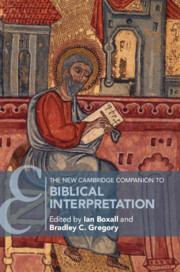Book contents
- The New Cambridge Companion to Biblical Interpretation
- Cambridge Companions to Religion
- The New Cambridge Companion to Biblical Interpretation
- Copyright page
- Contents
- Figures
- Contributors
- Acknowledgments
- Abbreviations
- Introduction
- Part I Methods
- 1 A Historical, Critical Retrospective on Historical Criticism
- 2 Historical Criticism
- 3 Philosophical Hermeneutics
- 4 Literary Criticism
- 5 Rhetorical Criticism
- 6 Intertextuality
- 7 Social-Scientific Criticism
- Part II Frameworks/Stances
- Part III Reception
- Scripture Index
- General Index
- Cambridge Companions to Religion
- References
4 - Literary Criticism
from Part I - Methods
Published online by Cambridge University Press: 15 October 2022
- The New Cambridge Companion to Biblical Interpretation
- Cambridge Companions to Religion
- The New Cambridge Companion to Biblical Interpretation
- Copyright page
- Contents
- Figures
- Contributors
- Acknowledgments
- Abbreviations
- Introduction
- Part I Methods
- 1 A Historical, Critical Retrospective on Historical Criticism
- 2 Historical Criticism
- 3 Philosophical Hermeneutics
- 4 Literary Criticism
- 5 Rhetorical Criticism
- 6 Intertextuality
- 7 Social-Scientific Criticism
- Part II Frameworks/Stances
- Part III Reception
- Scripture Index
- General Index
- Cambridge Companions to Religion
- References
Summary
The essay discusses the development of literary criticism and its various approaches, such as narrative criticism, reader-response criticism, and ideological criticism. Concepts such the implied author, text, and implied reader are also introduced, providing greater clarity of the principles employed by literary critics engaged in the narrative exegesis of the text.
- Type
- Chapter
- Information
- The New Cambridge Companion to Biblical Interpretation , pp. 73 - 90Publisher: Cambridge University PressPrint publication year: 2022

